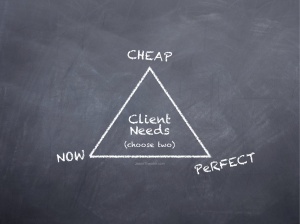What Do You Say When Clients Are Awful?
Negotiation theory is all good when you’re sitting in front of your computer screen, warm and cozy with a cup of tea and a snoring bulldog on your lap. Anything sounds possible under those circumstances! I’ll stand up for myself! It’ll be awesome!
But what do you say in the thick of things? How do you respond to ridiculous requests and offensive statements?
This week I take some recent submissions to Clients from Hell and tell you what to say when clients are awful.
Let’s start with a good one. And by that I mean, one where the right things are said within the submission.
CLIENT: I need that brochure TODAY.
ME: I’m sorry, but your deadline is two weeks from now. I have four other projects due this weekend.
CLIENT: But I’m giving you a deadline NOW.
ME: It’s not feasible to meet it, I’m sorry.
CLIENT: Fine! I’m taking your paycheque to hire someone else to do it.
ME: Well that’s your right.
CLIENT: Do you know anyone who can? Preferably for less than you were.
This is good because the boundaries of deadlines are reenforced, despite the fact that the client is pushing for change and pretending, yes, pretending, like that shouldn’t matter. When the client attempts to subvert that boundary, the freelancer politely rejects the attempt as “not feasible.”
The really tough stuff comes when the client threatens to walk; many people would freak out about losing business without thinking about the business they’re losing. This person is crappy business. They don’t follow agreements, are unreasonable and don’t value your time. They are a bad client and it’s perfectly fine to lose them.
But what do you say when they ask for a recommendation of someone else they might work with?
“Hell, no!”?
“Are you kidding me?!”?
“There’s this one guy I know who hates himself.”?
A polite, “I am not aware of anyone who would be able to meet your business requirements,” works just fine.
CLIENT: We won’t pay you if you don’t submit the reports by midnight tomorrow.
ME: But you haven’t even given me the complete data sets yet! I only have 6 out of 10!
CLIENT: We’ll give you the rest of them tomorrow, but we need to see your drafts timestamped March 31. Otherwise you won’t get paid.
After pulling a 30-hour writing marathon, I sent six drafts off via email, with three minutes to spare before the midnight deadline.
ME: Did you receive the drafts I sent to your email?
CLIENT: Yeah, thanks. I’ve forwarded them to upper management.
ME: Right. So what about the rest of the data sets I asked for.
CLIENT: Yeah, about that. We still haven’t received the data sets from the other project sites, so management is asking if they can send them by April 10th instead.
ME: …
CLIENT: And we still need to discuss if we’re going to pay you for your time.
Lesson #1: Use a contract! Contracts can spell out payment terms exactly so clients don’t have the wiggle room to pull this after the fact stuff. If they have operational issues that limit how they’ll be able to pay you, the contract can help bring that to everyone’s attention and you can figure out if the extra hoops are worth it.
Lesson #2: Do not give into unreasonable demands. If a client pulls something like this, the right thing to say is, “The terms we agreed to were that I would provide you with work and you would pay me for that work. If you are no longer able to meet our agreement, I will bill you for the work I’ve completed and deliver it to you once you’ve paid me. I will not be able to finish the full project based on your new terms.”
Lesson #3: Deposits can be good things. If it’s a large job and there will be work over a long period of time, ask for a deposit of 25-35% of the job’s costs up front. Be clear that the deposit is not refundable and is necessary before you’re able to begin work. If they say they don’t do deposits, you can say you don’t take on projects of this magnitude without deposits.
Client: We are very disappointed that it took you an extra day to do this project.
Me: I understand. However, the project was nearly twice as big as what we agreed on, a fact I pointed out to you in advance. Additionally, the overall time I billed for this assignment was 25% less than what you originally budgeted – as always, you got more work for less money.
Client: Yes, well you have far too many errors in the copy and pictures you uploaded
Me: Per your storyboards and emails, the errors existed in the content that I was given. You made the content.
CLIENT: Still, I feel you should give us a further discount for content errors.
This one sucks because it tries to shame you into giving up money you’ve earned.
What I would say after the client’s last line is this, “That sounds like you are suggesting I should pay you for the errors you gave me. That wasn’t how I understood our agreement.”
Sometimes people just need to hear how their suggestion sounds when phrased differently to realize they don’t really mean what they’re suggesting.
For those that don’t relent, a simple “No,” is fine.
CLIENT: I know you said 10 days, but I need it ready for print by the end of the week.
ME: I might be able to squeeze it in if I work late a few nights, but I can’t promise anything. It’s a big job.
CLIENT: Thanks, that’s very professional of you.
ME: No problem.
CLIENT: And because you’re so professional, I expect a 50% discount since it will only take you half the time.
This is soclose to being the right way to handle this question. The problem here is saying, “Yes, I can!” before saying, “It’s possible if….”
When a client asks if something is possible the answer is almost always going to be “Yes,” but that “yes” is going to come with certain requirements: that they pay more, that the deadline is extended, that they give up another portion of the job. Say those things before saying, “Yes, I can!”
In this case I suggest: “To shorten the deadline that significantly means my rush rate of $XXX/hour applies. Are you willing to agree to that change?”
“I don’t care if Papyrus isn’t a ‘web-safe font.’ Any person that doesn’t have Papyrus on [their] computer isn’t sophisticated enough to be my client.”
Oy vey.
Well, huh. Do you do the thing you know is wrong or do you refuse to follow the client’s direction? Do you propagate the violence that is Papyrus?
Before you do the work, have the client agree, by signing something or replying “I understand” to an email, that what they are asking for will only work in certain circumstances and if it does not work outside those circumstances, it does not justify a discount, withholding or other reduction in your fee.
What’s the worst thing a client’s told you? How’d you handle it?
Categories: Dealing with People







Thank you. This is very helpful.
What a great article!! We have to re-learn that the old maxim of “The client is always right” does not apply to our current society with its new economic paradigm.
The one thing that hasn’t changed is Time=Money. You want me to spend more time on you? It will cost you!
Great article, and I am sharing it everywhere!
Oh, dear. My response to all of these situations would most likely have been a hearty guffaw down the phone line. Oops.